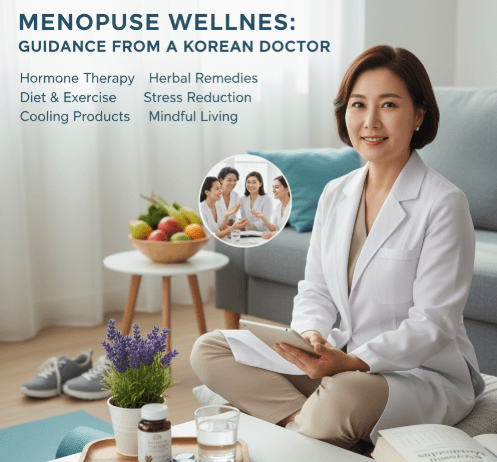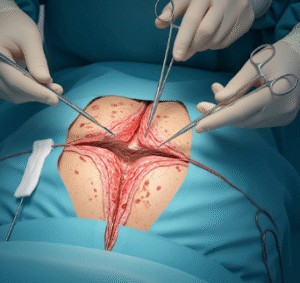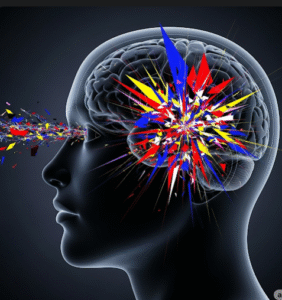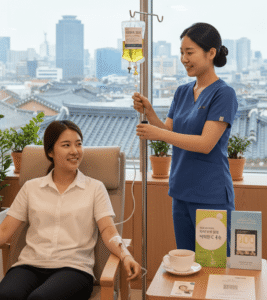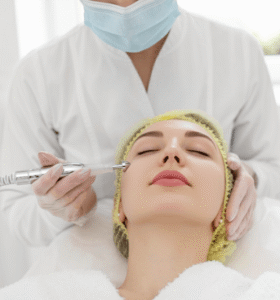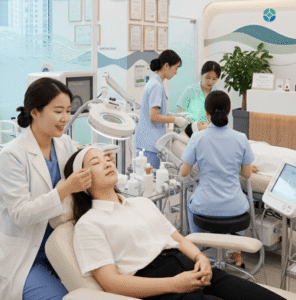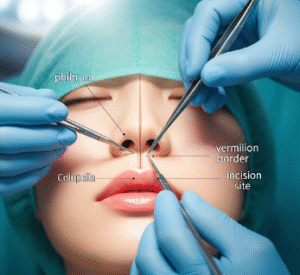What it is
Menopause is the natural biological process marking the end of a woman’s reproductive years, typically occurring between ages 45 and 55. It is diagnosed after 12 consecutive months without a menstrual period.
✔️ Cause: A decline in estrogen and progesterone production by the ovaries.
✔️ Symptoms: Hot flashes, night sweats, mood changes, vaginal dryness, decreased libido, sleep problems, and bone loss.
✔️ Management in Korea: A combination of medical treatments, lifestyle adjustments, and traditional Korean therapies to improve quality of life.
➡️ Korean clinics often integrate hormone replacement therapy, preventive screenings, and alternative medicine for holistic care.
Why it’s done
Menopause symptom management is important because it:
🔹 Relieves distressing symptoms such as hot flashes and insomnia.
🔹 Prevents osteoporosis by maintaining bone health.
🔹 Protects mental health by reducing mood swings, anxiety, and depression.
🔹 Improves sexual health by addressing dryness and pain during intercourse.
🔹 Supports long-term health by reducing risks of heart disease and metabolic disorders.
💡 Highlight: Proper management helps women transition through menopause with comfort and confidence, maintaining overall wellness.
Alternatives
Women in Korea have a variety of options beyond conventional medicine:
➡️ Lifestyle modifications – balanced diet, regular exercise, stress management.
➡️ Non-hormonal medications – antidepressants, gabapentin, or clonidine for hot flashes.
➡️ Herbal and natural remedies – soy isoflavones, red ginseng, and black cohosh are popular in Korea.
➡️ Acupuncture and traditional Korean medicine – widely practiced for symptom relief.
➡️ Vaginal moisturizers and lubricants – for dryness and discomfort without hormones.
⚠️ Note: Alternatives can be effective for mild symptoms, but women with severe or disruptive menopause symptoms may benefit more from hormone replacement therapy (HRT).
Preparation
Before starting menopause management in Korea, preparation includes:
✔️ Detailed consultation – discussion of symptoms, lifestyle, and health risks.
✔️ Blood tests – hormone levels, cholesterol, blood sugar, liver function.
✔️ Screening exams – Pap smear, mammogram, and bone density scan.
✔️ Medical history review – including cardiovascular health and family history of cancer.
✔️ Setting health goals – whether the focus is symptom relief, bone health, or sexual wellness.
💡 Tip: Korean clinics often provide comprehensive menopause health check packages, including lab tests and imaging.
How it’s done
Menopause symptom management in Korea usually involves a multi-approach plan:
- Hormone Replacement Therapy (HRT)
- Estrogen-only therapy (for women without a uterus).
- Combined estrogen-progesterone therapy (for women with a uterus).
- Available as pills, patches, gels, vaginal rings, or injections.
- Non-hormonal medications
- For women who cannot use HRT due to cancer history, blood clot risk, or personal preference.
- Lifestyle and diet changes
- Regular weight-bearing exercise to strengthen bones.
- Calcium and vitamin D supplementation.
- Healthy diet rich in vegetables, lean protein, and phytoestrogens (soy-based foods).
- Traditional Korean medicine
- Acupuncture for hot flashes and mood balance.
- Herbal remedies like red ginseng for energy and overall wellness.
- Sexual health support
- Vaginal estrogen therapy, moisturizers, and counseling for intimacy issues.
💡 Highlight: Korea’s approach blends modern medical treatments with holistic therapies, offering women a personalized care plan.
Recovery
Menopause management is ongoing rather than a one-time treatment. Recovery refers to symptom improvement and long-term health maintenance.
✔️ HRT or medications – improvements often noticed within weeks.
✔️ Bone health – requires months of consistent management.
✔️ Mental and emotional well-being – improves gradually with lifestyle and counseling.
✔️ Sexual wellness – addressed with vaginal therapies and supportive care.
When to revisit a doctor:
➡️ Side effects from HRT (headaches, breast tenderness, abnormal bleeding).
➡️ Worsening hot flashes, mood swings, or sleep problems.
➡️ Concerns about bone density, cardiovascular health, or cancer risk.
💡 Important: Regular follow-ups are essential in Korea, with doctors monitoring hormones, bone health, and cardiovascular status.
Treatment option in Korea
Korea provides comprehensive and advanced menopause care:
⭐ University hospitals and women’s health centers with specialized menopause clinics.
⭐ Access to both Western and traditional Korean medicine for personalized care.
⭐ Affordable treatment plans compared to many Western countries.
⭐ Holistic health programs combining HRT, bone health management, and lifestyle counseling.
⭐ Multilingual services in major hospitals for international patients.
💡 Highlight: Korea’s menopause management focuses on balancing symptom relief, disease prevention, and quality of life.
Key Highlights
✔️ Menopause causes hormonal decline, leading to symptoms like hot flashes and bone loss.
✔️ Management options include HRT, non-hormonal medications, lifestyle changes, and Korean traditional medicine.
✔️ Preparation involves screenings for cancer, heart health, and bone density.
✔️ Recovery is ongoing, with improvements seen in weeks to months.
✔️ Korean healthcare system offers advanced, affordable, and holistic care for menopausal women.

